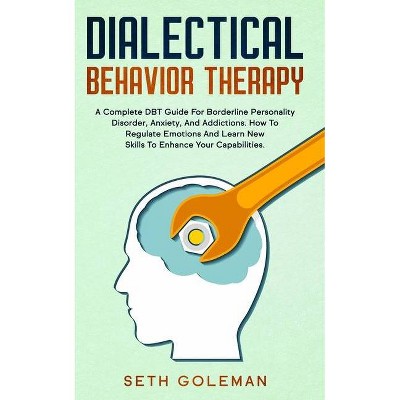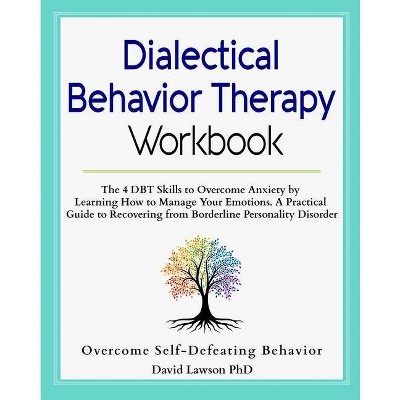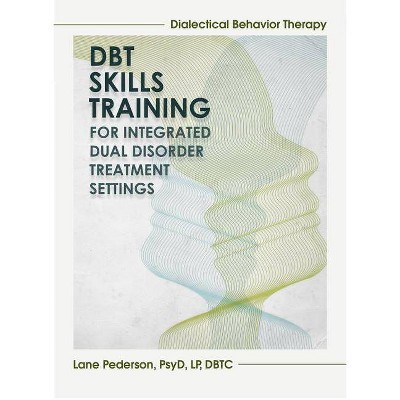Dialectical Behavior Therapy P - by Barbara Stanley & Beth S Brodsky (Paperback)

Similar Products
Products of same category from the store
AllProduct info
<p/><br></br><p><b> Book Synopsis </b></p></br></br><p>Dialectical Behavior Therapy (DBT) has quickly become a treatment of choice for individuals with borderline personality disorder and other complicated psychiatric conditions. Becoming proficient in standard DBT requires intensive training and extensive supervised experience. However, there are many DBT principles and procedures that can be readily adapted for therapists conducting supportive, psychodynamic, and even other forms of cognitive behavioral treatments.Despite this, there is a dearth of easily accessible reading material for the busy clinician or novice.</p> <p>This new book provides a clinically oriented, user-friendly guide to understanding and utilizing the principles and techniques of DBT for non-DBT-trained mental health practitioners and is an ideal guide to DBT for clinicians at all levels of experience.</p> <p>Written by internationally recognized experts in suicide, self injury and borderline personality disorder, it features clinical vignettes, following patients through a series of chapters, clearly illustrating both the therapeutic principles and interventions.</p><p/><br></br><p><b> From the Back Cover </b></p></br></br><p>Dialectical Behavior Therapy (DBT) has quickly become a treatment of choice for individuals with borderline personality disorder (BPD), suicidal behavior, non-suicidal self injury, and other complicated psychiatric conditions. However, there are very few well-trained DBT practitioners, limited opportunities for training, and a dearth of easily accessible reading material. Becoming proficient in fully adherent DBT requires intensive training and years of experience. Fortunately, many DBT principles and procedures can be readily adapted for therapists conducting supportive, psychodynamic, and even cognitive behavioral treatments.</p> <p><i>The Dialectical Behavior Therapy Primer</i> fulfills a great demand for an easy to read, simplified translation of the complexities of DBT. The authors provide a clear, comprehensive summary of DBT principles and techniques illustrated with rich clinical vignettes. Through addressing the top ten questions clinicians ask about working with individuals who have BPD, the authors encourage a conversion to the "DBT way of thinking" about psychotherapy as well as BPD. Through personal discussion of their experience, they share how they have come to understand the emotional and behavioral world of individuals with severe difficulty with emotion regulation. Their orientation is that, in order to maintain these individuals in treatment, to reduce symptoms, and to increase capacity for positive life experience, therapists need to rethink their assumptions and interpretations and take on more responsibility for treatment failure. The dialectic worldview, when applied to the treatment of BPD, provides therapists with a viable alternative theoretical approach. The authors take pains to illustrate how the dialectic philosophy underlies each DBT intervention and how integral this way of thinking is to the effective practice of DBT.</p> <p>This book is the ideal guide to DBT for clinicians at all levels of experience.</p> <p>Related Titles</p> <p><b>Psychodynamic Formulation</b><br /> Deborah L. Cabaniss, Sabrina Cherry, Carolyn J. Douglas, Ruth Graver, and Anna R. Schwartz<br /> 9781119962342</p> <p><b>Psychodynamic Psychotherapy: A Clinical Manual</b><br /> Deborah L. Cabaniss, Sabrina Cherry, Carolyn J. Douglas, and Anna R. Schwartz<br /> 9780470684719</p><p/><br></br><p><b> Review Quotes </b></p></br></br><br><p>"As the authors state at the outset, it is likely most useful for clinicians wondering what DBT is and what it includes, as well as for non-clinicians wondering what DBT is about. Some of the concepts are good therapy (e.g., the emphasis on validation), whereas some are unique to DBT (e.g., the consult team). Because some of the elements of DBT are good practice and can be incorporated into other treatment modalities, the authors succeed in finding a middle path between ignorance of DBT and trained practice of allelements." (<i>British Journal of Psychology</i>, 6 January 2014)</p><br><p/><br></br><p><b> About the Author </b></p></br></br><p><b>Beth S. Brodsky</b>, Ph.D. is Associate Clinical Professor of Medical Psychology in Psychiatry at Columbia University, and a research scientist at the New York State Psychiatric Institute. Her areas of expertise include and psychotherapeutic treatment of self-destructive behavior in borderline disorder (BPD). She is the Principal Investigator (along with Barbara Stanley)of a NIMH Excellence in Education to develop and implement a clinical/research curriculum teaching Dialectical Therapy (DBT) in a medical setting. She is the author of many articles and chapters on BPD, DBT, suicide and self-injury and is a frequently invited speaker on BPD, suicidal behavior and DBT. She is a member of the Virginia Apgar Academy of Medical Educators at Columbia University College of Physicians and Surgeons.<br /> <br /> <b>Barbara Stanley</b>, Ph.D. is Professor of Clinical Psychology in the Department of Psychiatry at Columbia University College of Physicians & Surgeons and Research Scientist at New York State Psychiatric Institute. She is a trainer in Dialectical Behavior Therapy for Behavioral Tech, LLC. She has been the principal investigator on NIH-funded grants investigating suicidal behavior, self injury, aggression and borderline personality disorder. She is currently conducting a treatment trial investigating the mechanisms of action of DBT and antidepressants. Along with Dr. Beth Brodsky, she is a principal investigator on an NIMH-funded grant to develop a DBT training curriculum for psychiatrists-in-training. She has won numerous awards including the American Foundation for Suicide Prevention Research Award and the Suicide Prevention Center of New York Research Award.</p>
Price History
Price Archive shows prices from various stores, lets you see history and find the cheapest. There is no actual sale on the website. For all support, inquiry and suggestion messages communication@pricearchive.us



















